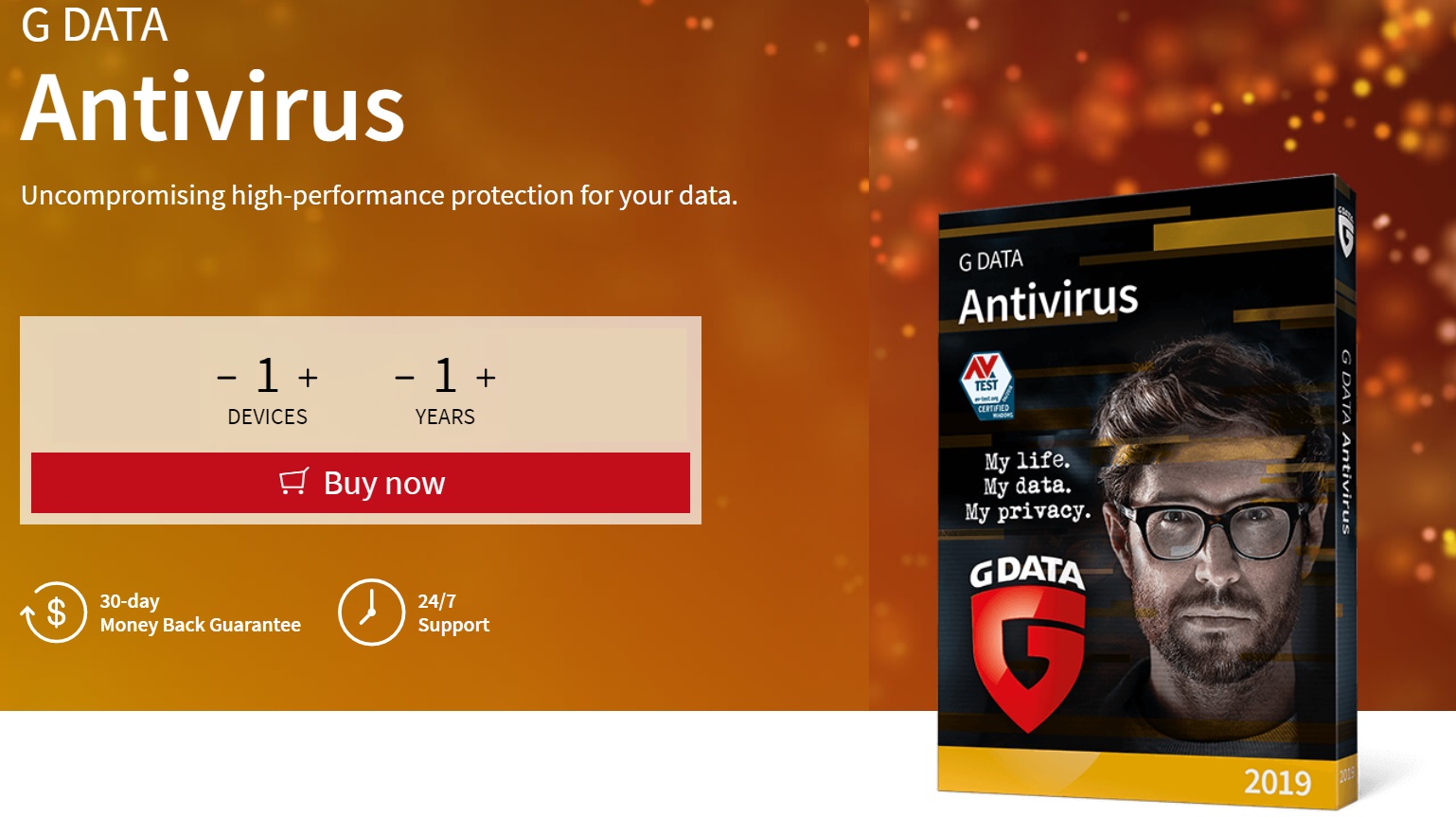Our Verdict
G Data Antivirus is precise and reliable when it comes to stopping malware. There are some performance impact issues that can slow some systems down, but we think overall G Data Antivirus is worth at least a trial for most users.
For
- Powerful antivirus
- Effective spam filtering
- Keylogger protection
Against
- Negatively impacts performance
- Minor scanning issues
- Expensive
Why you can trust Creative Bloq
G Data Antivirus is a complete PC security suite, and has earned a place in our roundup of the best antivirus software. Despite being G Data's entry-level antivirus software, it provides protection from exploits, anti-ransomware, URL filtering, spam filtering, and a dedicated browser that gives safety to online banking, shopping and any other financial transactions.
The program uses several technologies to keep you safe, including its own virus scanning engine. Also included is the Bitdefender engine, and a CYREN-based layer that can detect outbreaks instantly.
Single device licenses come in at $29.95 (£24) for a subscription that renews annually. Other top ranked competitors, such as Bitdefender Antivirus Plus and Kaspersky Anti-Virus have a similar subscription fee.
Savings are available for additional computers or extending the license term, so for instance a five PC, two-year license has an affordable cost of $94.95 (£75). There are also other solutions that have package deals for multiple devices, with multiple years of subscription.
A free trial is also available, along with the security of a 30-day money-back guarantee if you are not satisfied with the performance on your system.
Setup
The G Data Antivirus trial proved to be a simple download. Installation does take some time with the downloading of the components for setup, but beyond the initial step, everything proceeded nicely, without any further issues.
G Data requires new users to register by providing their name and email address. There is also a request for a physical address and phone number, but you can skip this step.
Right after we completed the main setup process, a window popped up and recommended we install G Data WebProtection. This is a Chrome extension for the prevention of phishing, scams and malicious sites. We prefer this to be controlled at the network level (rather than just a single browser), thereby ensuring coverage of all the browsers and our system apps. However, G Data claims this approach gives them higher accuracy- although we're kind of unsure how this would be.
Looking under the hood, G Data occupies 600MB of hard drive capacity, with seven new background processes that consume a full 250MB of RAM. With our system running full load, we did notice the negative impact on performance. We didn't independently measure this impact on performance, but we'll discuss what leading labs have found below.
Features
G Data Antivirus interface provides more information and options than its competition that take the more minimalist approach, and we appreciated this approach.
This includes an opening screen that doesn't dumb things down by glossing over the security status with merely the a ‘Protected’ caption, or a ‘All good!’ green tick, as some other antivirus solutions do. G Data indicates the system’s security status along seven protection layers, including the update details, system messages, and license information.
Clicking any of these will reveal a menu of related options. For example, clicking on Web Protection launches a menu with options to disable URL filtering, add exceptions, or open the Settings dialog for even additional adjustments. Additionally, the status lines for Real Time Protection, Spam Protection and other layers give quick access to frequently used settings – a convenient feature that optimizes the use of screen space and simplifies navigation.
The Virus Protection tab also makes it easy to jump to the links to launch the several types of scans: quick, full, check specific files or folders, removable drives, and scan for rootkits.
Scan times are faster than average, and G Data Antivirus detected each and every malware sample presented to it, with no false alarms.
To nitpick, we were annoyed with G Data's inability to run two scans simultaneously. With the program running a full system scan, attempting to initiate a second scan on the latest download from Explorer's right-click menu just gets a 'Can't do that, a scan is already running' message.
Thankfully, the URL filter performs without complaint, as it can block nearly all the threatening web URLs. We’re really not clear why G Data persistently recommends the installation of its browser extensions, though. Perhaps they do have a higher rate of detection, but this Chrome extension lacks configuration options while failing to add much to our eye.
The competent spam filter is a welcome addition, slotting nicely into our Outlook installation, and provides a nice array of options to tweak. We didn't go in-depth on it ourselves, but with our small sample, the module is a step up from the Outlook default Junk filter, and is close to a commercial anti-spam solution.
Some other G Data Antivirus elements were tricky to test. For example, the BankGuard and exploit protection elements endeavor to protect vulnerable processes by working deep inside the engine, but there was really no reasonable way for evaluating their performance for this review.
Next up is the Keylogger Protection module, which is designed for the protection of a limited number of applications, mostly just the popular browsers. We matched it up against a commercial keylogger program, and it didn't manage to record anything entered online. This security can be extended for other apps, but G Data does indicate that not all programs are compatible with this technology.
The Autostart Manager optimizes your PC by delaying the launch of the nonessential Windows startup programs. Let’s say that you've grown tired of that grabby Steam client sucking down resources with each system boot. Now, you can delay its start for two minutes, or a number you specify. Fewer starting processes at boot time gets us a PC that can get to work quicker, although the delayed programs will be loaded after the delay. While we like this feature, also bear in mind that there's excellent free software available that can also perform this function.
The control is via a slick settings dialog incorporating many opportunities to tweak. For instance, the Network Access dialog allows you to specify the network to use for downloading updates, and allows you to stop the program from chewing up bandwidth if on a metered connection.
G Data Antivirus doesn't have the most expansive feature list, but overall we like this product, as it does perform admirably at its core function: keeping users safe from malware.
Protection
While we do run some malware tests during antivirus reviews, we also check out the major testing labs which can run a full suite of testing, so it's critical to check out these reports for the most comprehensive picture.
Unfortunately, AV Comparatives hasn't included G Data products over the last few years, but AV-Test has tested them, and with positive results. The September/October 2018 Best Antivirus Software for Windows Home User reports the program gives protection from 100% of widespread malware, and approaches 100% on zero-day attacks, to give it the maximum protection score. The downside of this is that there was more than the usual impact on performance, which overall dropped G Data's score.
Next, we looked deeper into the performance questions, and turned to PassMark's Consumer Security Products Performance Benchmarks 2019 (Second Edition). This report assesses 14 security programs on 23 key points to examine how it impacts performance. Unfortunately, G Data falls short on this testing, placing in the lower half of the field in ninth place; only Avast/AVG, some Trend Micro products, and Bitdefender Internet Security got even lower scores.
While the low scores are disappointing, let’s place them in context. G Data does score strongly on at least some of the PassMark testing. Also, the true differences between the packages are fairly miniscule, and many value the security over the speed of the program anyway. For those that remain unsure, go ahead and peruse PassMark's report for all the finer points.
We aspired to have finish this review with a matchup between G Data Antivirus versus our custom ransomware simulator, which examines how this software can counteract the ransomware via behavior alone. This ended up being truly impossible, as G Data Antivirus closed down the file prior to us running it. Out of this experience, we can’t make a statement regarding G Data's behavior monitoring abilities, however, we can state that it is a champ when it comes to static file detection, and kept us totally safe.

Thank you for reading 5 articles this month* Join now for unlimited access
Enjoy your first month for just £1 / $1 / €1
*Read 5 free articles per month without a subscription

Join now for unlimited access
Try first month for just £1 / $1 / €1
out of 10
G Data Antivirus is precise and reliable when it comes to stopping malware. There are some performance impact issues that can slow some systems down, but we think overall G Data Antivirus is worth at least a trial for most users.

Sead Fadilpašić works as a staff journalist at Cryptonews.com, where he regularly writes news on and analyses blockchain and cryptocurrency. Based in Sarajevo, Sead previously worked as a freelance journalist, with Techradar Pro being one of the titles he contributed to during this time.

